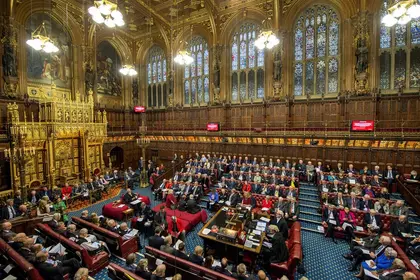As James Cleverly, Secretary of State for Foreign, Commonwealth and Development affairs this week brought President Zelensky news of additional military and civilian aid to help with the war effort, the conversation in London turned to reconstruction.
Lord Ahmad, minister of state at the Foreign, Commonwealth and Development Office (FCDO) faced questions on the U.K.’s role in the post-war reconstruction of Ukraine and transparency of agencies to which funds are being directed.
Opening with a statement on existing commitments and the developments from the Recovery, Reconstruction and Modernization of Ukraine Conference in Germany on Oct. 25, Lord Ahmad said: “We aim to build on the progress made at this year’s Ukraine recovery conference, using our international influence and our commitment to drive delivery of Ukraine’s recovery.”
At the same conference, European Commission President Ursula von der Leyen promised 18 billion euros of financial aid approved as a loan to Ukraine by the European Parliament on Nov. 24.
Reconstruction funds – how much is enough?
While dealing with the issue of macroeconomic stability, the European Union (EU) promise did not delve into the topic of reconstruction funds. Furthermore, a pertinent question regarding the scale of the sums needed was raised by Lord Lancaster.
“In June, the World Bank conducted a rapid damage assessment and concluded that $349 billion would be required to reconstruct Ukraine. That figure is already six months out of date. According to the latest figures from the World Bank, we have raised $19.1 billion, less than 5 percent of what is required,” Lord Lancaster said.

Ukraine’s 200th Pilot Earns Wings in UK Flying Course – Next Step F-16 Fighters
In his response, Lord Ahmad pointed to the difficulty in both estimating the costs and undertaking reconstruction during war time. Speaking of the constant Russian attacks on Ukrainian civilian targets such as schools and hospitals, he talked of the constant setbacks created by the Russian bombings and the ongoing British effort to support the Ukrainian reconstruction effort.
Particular attention was paid to the economic cost of the war for those currently in Ukraine. Lord Ahmad noted: “Currently, about 60 percent of people in Ukraine are living on less than $5.50 per day—up from 2 percent in 2021. We are playing a significant role bilaterally. The U.K. has also unlocked £1.4 billion of finance for Ukraine through working with multilateral institutions and multilateral development banks.”
The debate then turned to the question of accountability and transparency of funds provided to Ukraine, originating from the taxpayer’s purse in the UK.
Lord Ahmad said “One of the real challenges we have in any conflict is ensuring that money reaches those who require it. It is a continued commitment”.
Referring to the previous challenges of corruption and embezzlement faced by UK agencies in Afghanistan and the Middle East, the minister said “I know first-hand the continued challenges, with people looking to intervene and interject, particularly with financial support throughout the country. These are the very points that we are focused on in respect of Ukraine.”
Answering a question of a fellow member of the Lords, the minister outlined what the primary criteria are when it comes to funds and funding organizations supporting Ukraine, saying “it must be efficient, effective and transparent, ultimately ensuring delivery of the true purpose—the reconstruction of Ukraine.”
Events and forums on securing investment and obtaining funding for the reconstruction of Ukraine continue in the U.K. as the 6th Annual Ukrainian Investment Roadshow was hosted on Nov. 17 and the Ukrainian Infrastructure Forum is due to take place on Dec. 2.
You can also highlight the text and press Ctrl + Enter






